高中英语作文范文:关于抄袭About Plagiarizing
抄袭 英语作文

I am a diligent student who usually takes pride in my work and academic achievements. However, due to a combination of procrastination and lack of understanding of the topic, I found myself struggling to complete an English essay on time. Fearing the consequences of late submission and a low grade, I succumbed to the temptation of copying a few paragraphs from an online source without proper citation.
V. Steps to Rectify the Situation
In order to rectify the situation, I have taken the following steps. Firstly, I have personally apologized to my teacher and classmates for my actions, expressing sincere remorse and a commitment to never engage in plagiarism again. Additionally, I have retracted my plagiarized essay and committed to rewriting it from scratch, ensuring proper research, citation, and originality in my work. Furthermore, I have requested additional support and guidance from my teacher to improve my understanding of the subject and enhance my writing skills.
拒绝抄袭英语作文

拒绝抄袭英语作文Title: Refusing to Plagiarize in English Composition。
Plagiarism is a serious ethical violation that undermines the integrity of academic work and personal credibility. It not only violates the trust between students and educators but also devalues the effort and originality that should be the cornerstone of intellectual pursuit. Therefore, I staunchly refuse to engage in any form of plagiarism in my English compositions. Here are several reasons why I hold this stance:Firstly, plagiarism contradicts the fundamental principles of academic honesty and integrity. As students, we are tasked with expanding our knowledge, honing our critical thinking skills, and expressing our unique perspectives. Copying someone else's work not only deprives us of the opportunity to develop these skills but also misrepresents our academic capabilities. It is essential to uphold the values of honesty and authenticity in allacademic endeavors.Secondly, plagiarism undermines the learning process. The act of researching, synthesizing information, and crafting original arguments is integral to the educational experience. By plagiarizing, we bypass the essential steps of learning and growth, opting for shortcuts thatultimately hinder our intellectual development. Embracing the challenges of independent thinking and creative expression fosters a deeper understanding of the subject matter and cultivates valuable skills that extend beyond the classroom.Furthermore, plagiarism diminishes the value of education. Academic institutions serve as bastions of knowledge and innovation, where ideas are exchanged, challenged, and refined. Plagiarism erodes the credibility of academic achievements and undermines the reputation of educational institutions. It compromises the integrity of scholarly discourse and diminishes the pursuit of truth and knowledge.Additionally, plagiarism has severe consequences, both academically and professionally. In academic settings, it can result in failing grades, disciplinary action, and irreparable damage to one's academic record. Beyond academia, plagiarizing can tarnish one's reputation and credibility, impacting future opportunities and career prospects. Employers and institutions value individuals who demonstrate integrity, originality, and ethical conduct.In conclusion, I adamantly refuse to plagiarize in my English compositions or any other academic endeavors. Upholding the principles of academic integrity, respecting the learning process, preserving the value of education, and recognizing the consequences of plagiarism are paramount. By committing to originality, honesty, and ethical conduct, I strive to uphold the integrity of academic scholarship and contribute positively to the pursuit of knowledge and innovation.。
抄袭带来的影响英语作文
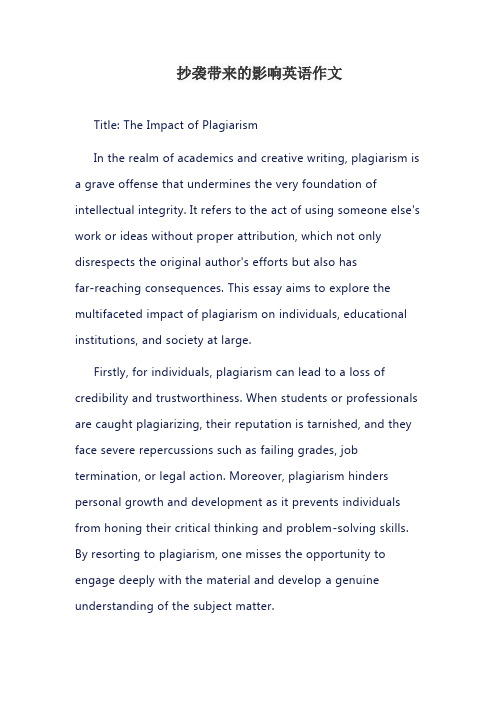
抄袭带来的影响英语作文Title: The Impact of PlagiarismIn the realm of academics and creative writing, plagiarism is a grave offense that undermines the very foundation of intellectual integrity. It refers to the act of using someone else's work or ideas without proper attribution, which not only disrespects the original author's efforts but also hasfar-reaching consequences. This essay aims to explore the multifaceted impact of plagiarism on individuals, educational institutions, and society at large.Firstly, for individuals, plagiarism can lead to a loss of credibility and trustworthiness. When students or professionals are caught plagiarizing, their reputation is tarnished, and they face severe repercussions such as failing grades, job termination, or legal action. Moreover, plagiarism hinders personal growth and development as it prevents individuals from honing their critical thinking and problem-solving skills. By resorting to plagiarism, one misses the opportunity to engage deeply with the material and develop a genuine understanding of the subject matter.Secondly, in educational settings, plagiarism poses a significant threat to the quality of education. It creates an unfair playing field where those who cheat can gain unearned grades, devaluing the hard work and dedication of honest students. Furthermore, plagiarism can lead to a lack of innovation and stagnation in research as new ideas are not cultivated, and existing knowledge is not challenged or expanded upon.Thirdly, on a societal level, plagiarism can have detrimental effects on the progress of various fields. In the world of literature, for instance, plagiarism can lead to a loss of originality and diversity in storytelling. In science and technology, it can result in missed opportunities for advancement and innovation due to a lack of novel research. Additionally, widespread plagiarism can erode public trust in academic and professional institutions, leading to a general skepticism towards expertise and authority.Finally, it is essential to acknowledge the role of technology in both facilitating and combating plagiarism. On one hand, the internet provides easy access to a vast array of information, making it tempting for some to cut corners by copying and pasting content without proper citation. On the other hand, advanced plagiarism detection software has becomeincreasingly sophisticated, enabling educators and publishers to identify and address instances of plagiarism more effectively.In conclusion, the impact of plagiarism is far-reaching and affects individuals, educational institutions, and society as a whole. It undermines the integrity of scholarship and creativity, hinders personal and intellectual growth, and can damage the credibility of entire fields of study or professional domains. As such, it is crucial to foster a culture of honesty and originality, where the value of unique thought and diligent work is recognized and upheld. By doing so, we can ensure that the pursuit of knowledge and the creation of new ideas remain at the heart of our academic and professional endeavors.。
关于抄袭的英语作文

关于抄袭的英语作文英文回答:Plagiarism is a serious issue that affects students, writers, and researchers around the world. It is the act of using someone else's work, ideas, or words without giving them proper credit. As a writer myself, I understand the importance of originality and the consequences of plagiarism.Plagiarism can take many forms, such as copying and pasting text from the internet without citation, using someone else's ideas without permission, or even purchasing a paper from a ghostwriter. In my experience, I have seen cases of students copying essays from their peers or using online sources without acknowledging the original authors.The consequences of plagiarism can be severe. In academic settings, students can face failing grades, suspension, or even expulsion for plagiarizing. Inprofessional settings, writers and researchers can damage their reputation and credibility by being accused of plagiarism. In some cases, legal action can be taken against those who plagiarize.To avoid plagiarism, it is important to always give credit to the original source when using someone else's work. This can be done through proper citation, quotation marks, and paraphrasing. Additionally, it is crucial to develop one's own ideas and writing style to reduce the temptation of copying from others.In my opinion, plagiarism is not only unethical but also detrimental to one's personal and professional growth. By relying on the work of others, individuals miss out on the opportunity to develop their own skills and knowledge. As the saying goes, "honesty is the best policy," and this certainly applies to writing and academic integrity.中文回答:抄袭是一个严重的问题,影响着世界各地的学生、作家和研究人员。
我们应该看待抄袭问题英语作文
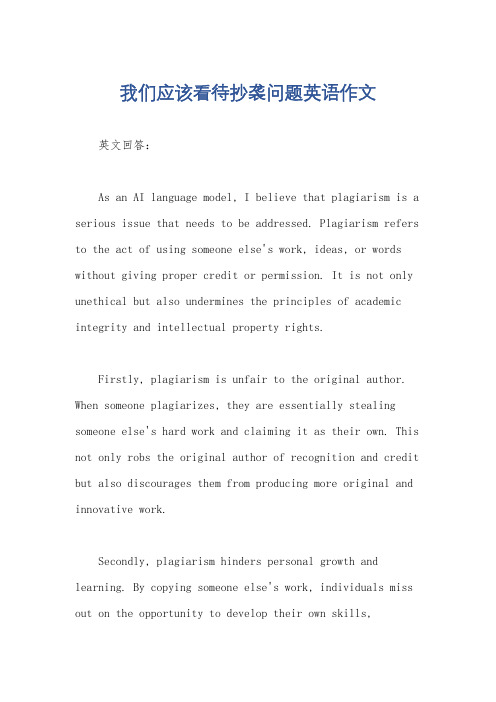
我们应该看待抄袭问题英语作文英文回答:As an AI language model, I believe that plagiarism is a serious issue that needs to be addressed. Plagiarism refers to the act of using someone else's work, ideas, or words without giving proper credit or permission. It is not only unethical but also undermines the principles of academic integrity and intellectual property rights.Firstly, plagiarism is unfair to the original author. When someone plagiarizes, they are essentially stealing someone else's hard work and claiming it as their own. This not only robs the original author of recognition and credit but also discourages them from producing more original and innovative work.Secondly, plagiarism hinders personal growth and learning. By copying someone else's work, individuals miss out on the opportunity to develop their own skills,knowledge, and creativity. The process of researching, analyzing, and synthesizing information is crucial for personal development and intellectual growth.Furthermore, plagiarism undermines the value of education and qualifications. When individuals cheat by plagiarizing, they devalue the efforts of those who have worked hard to earn their qualifications honestly. It creates an unfair advantage for those who engage in dishonest practices, leading to a lack of trust and credibility in the academic and professional world.In addition, plagiarism can have serious consequences.In academic settings, it can result in disciplinary actions, such as failing grades, suspension, or even expulsion. In professional environments, it can lead to damaged reputations, legal disputes, and loss of job opportunities. These consequences highlight the importance of originality and integrity in all aspects of life.To combat plagiarism, it is essential to promote awareness and education about academic integrity. Schools,universities, and workplaces should provide clear guidelines on proper citation and referencing techniques. Additionally, technology can play a significant role in detecting and preventing plagiarism. Plagiarism detection software can help identify similarities between texts and highlight potential instances of plagiarism.In conclusion, plagiarism is a serious issue that should not be taken lightly. It not only harms the original authors but also hinders personal growth and undermines the value of education and qualifications. By promoting awareness, education, and the use of technology, we can work towards creating a culture of integrity and originality.中文回答:抄袭问题是一个需要解决的严重问题。
关于剽窃的英文作文
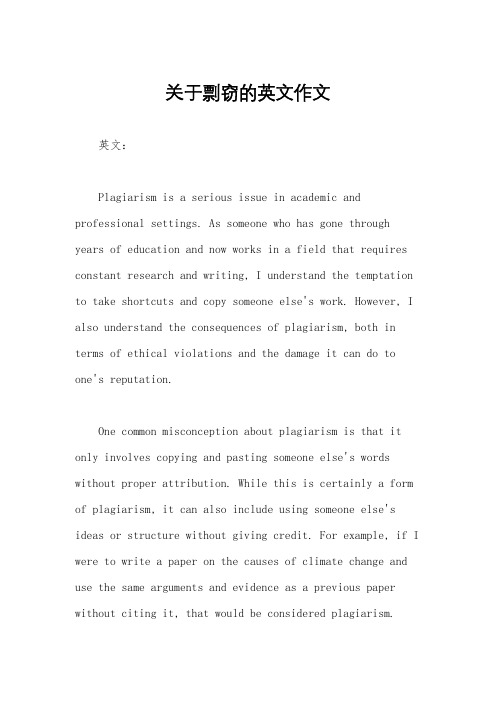
关于剽窃的英文作文英文:Plagiarism is a serious issue in academic and professional settings. As someone who has gone through years of education and now works in a field that requires constant research and writing, I understand the temptation to take shortcuts and copy someone else's work. However, I also understand the consequences of plagiarism, both in terms of ethical violations and the damage it can do toone's reputation.One common misconception about plagiarism is that it only involves copying and pasting someone else's words without proper attribution. While this is certainly a form of plagiarism, it can also include using someone else's ideas or structure without giving credit. For example, if I were to write a paper on the causes of climate change and use the same arguments and evidence as a previous paper without citing it, that would be considered plagiarism.Another issue with plagiarism is the impact it can have on one's own learning and growth. When we rely too heavily on others' work, we miss out on the opportunity to develop our own critical thinking and writing skills. Additionally, if we are caught plagiarizing, we may face consequences such as failing a course or losing our job.Ultimately, plagiarism is a form of dishonesty that undermines the integrity of academic and professional work. It is important to always give credit where credit is due and to put in the effort to produce original work.中文:剽窃在学术和职业领域都是一个严重的问题。
我抄袭别人的作业英语作文
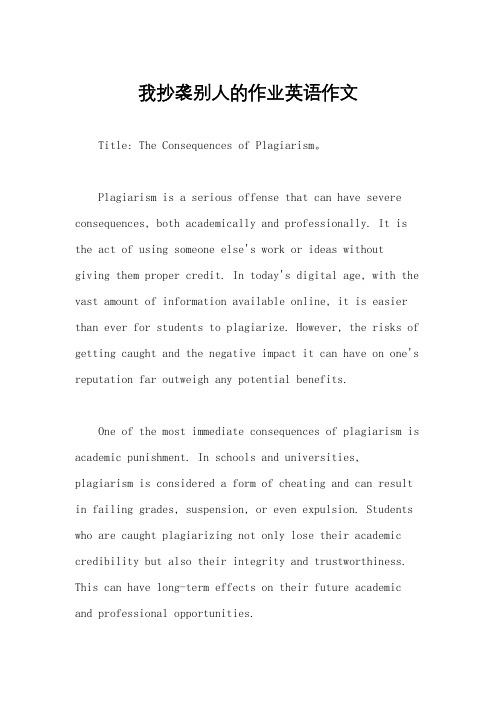
我抄袭别人的作业英语作文Title: The Consequences of Plagiarism。
Plagiarism is a serious offense that can have severe consequences, both academically and professionally. It is the act of using someone else's work or ideas withoutgiving them proper credit. In today's digital age, with the vast amount of information available online, it is easier than ever for students to plagiarize. However, the risks of getting caught and the negative impact it can have on one's reputation far outweigh any potential benefits.One of the most immediate consequences of plagiarism is academic punishment. In schools and universities, plagiarism is considered a form of cheating and can result in failing grades, suspension, or even expulsion. Students who are caught plagiarizing not only lose their academic credibility but also their integrity and trustworthiness. This can have long-term effects on their future academic and professional opportunities.Furthermore, plagiarism can have legal consequences. Copyright laws protect the original work of authors, artists, and creators, and using someone else's work without permission is a violation of these laws. In some cases, individuals or organizations may take legal action against those who plagiarize their work, resulting in fines or even lawsuits. This can not only damage one's reputation but also lead to financial repercussions.In the professional world, the consequences of plagiarism can be even more severe. Employers valueintegrity and honesty in their employees, and those who have a history of plagiarism may find it difficult to secure employment or advance in their careers. In fields such as journalism, academia, and research, whereoriginality and credibility are paramount, being known as a plagiarist can be a career-ending label.Moreover, the consequences of plagiarism extend beyond the individual who committed the act. When someone plagiarizes, they are not only taking credit for someoneelse's work but also devaluing the original creator's efforts. This can have a ripple effect, undermining the integrity of the academic or professional community as a whole.To avoid the severe consequences of plagiarism, it is essential for students and professionals to understand the importance of originality and proper citation. By taking the time to research, write, and attribute sources correctly, individuals can protect themselves from the negative repercussions of plagiarism. Additionally, educators and employers must take a proactive approach to educating others about the ethical and legal implications of plagiarism and enforcing consequences for those who engage in this dishonest practice.In conclusion, plagiarism is a serious offense that can have far-reaching consequences for individuals and society as a whole. By understanding the risks and taking steps to prevent plagiarism, we can uphold the values of integrity, honesty, and respect for intellectual property. It is crucial for all of us to do our part in promotingoriginality and ethical behavior in academia and the professional world.。
抄袭的坏处英语作文
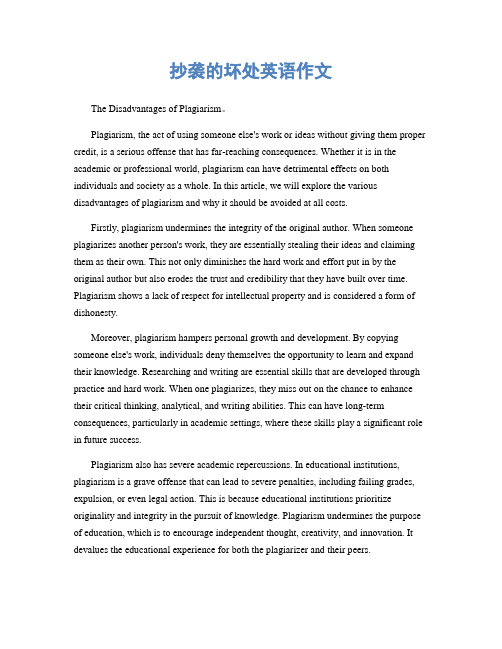
抄袭的坏处英语作文The Disadvantages of Plagiarism。
Plagiarism, the act of using someone else's work or ideas without giving them proper credit, is a serious offense that has far-reaching consequences. Whether it is in the academic or professional world, plagiarism can have detrimental effects on both individuals and society as a whole. In this article, we will explore the various disadvantages of plagiarism and why it should be avoided at all costs.Firstly, plagiarism undermines the integrity of the original author. When someone plagiarizes another person's work, they are essentially stealing their ideas and claiming them as their own. This not only diminishes the hard work and effort put in by the original author but also erodes the trust and credibility that they have built over time. Plagiarism shows a lack of respect for intellectual property and is considered a form of dishonesty.Moreover, plagiarism hampers personal growth and development. By copying someone else's work, individuals deny themselves the opportunity to learn and expand their knowledge. Researching and writing are essential skills that are developed through practice and hard work. When one plagiarizes, they miss out on the chance to enhance their critical thinking, analytical, and writing abilities. This can have long-term consequences, particularly in academic settings, where these skills play a significant role in future success.Plagiarism also has severe academic repercussions. In educational institutions, plagiarism is a grave offense that can lead to severe penalties, including failing grades, expulsion, or even legal action. This is because educational institutions prioritize originality and integrity in the pursuit of knowledge. Plagiarism undermines the purpose of education, which is to encourage independent thought, creativity, and innovation. It devalues the educational experience for both the plagiarizer and their peers.Additionally, plagiarism can damage professional reputation and credibility. In the professional world, originality and expertise are highly valued. Employers expect employees to produce authentic work that demonstrates their skills and knowledge. When an individual is caught plagiarizing, it not only reflects poorly on their integrity but also raises doubts about their abilities. This can result in job loss, damage to professional relationships, and long-term career setbacks.Furthermore, plagiarism stifles innovation and progress. Original ideas are the driving force behind advancements in various fields. When individuals plagiarize, they hinder the development of new ideas and limit creativity. This can have serious implications in areas such as scientific research, where originality and authenticity are crucial. Plagiarism slows down the progress of society as a whole, as it prevents the free flow of knowledge and ideas.In conclusion, the disadvantages of plagiarism are numerous and far-reaching. From undermining the integrity of the original author to hindering personal growth and development, plagiarism has severe consequences for individuals and society. It damages academic and professional reputations, stifles innovation, and hampers progress. It is essential for individuals to understand the negative impact of plagiarism and strive for originality, integrity, and respect for intellectual property. By doing so, we can contribute to a more honest, innovative, and prosperous world.。
解决抄袭论文问题英文作文
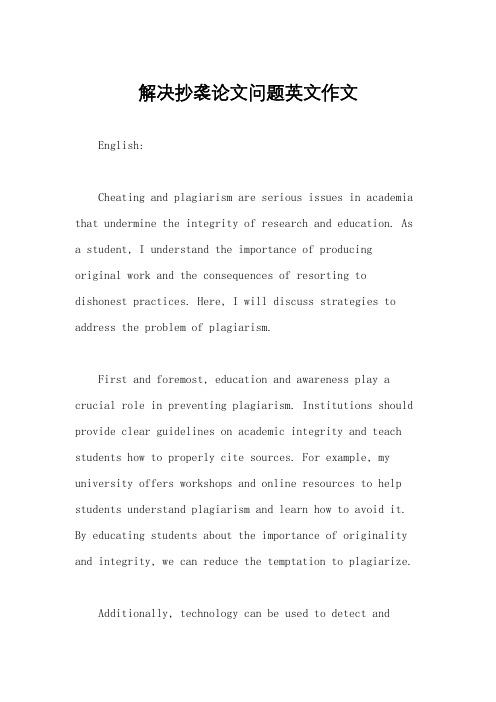
解决抄袭论文问题英文作文English:Cheating and plagiarism are serious issues in academia that undermine the integrity of research and education. As a student, I understand the importance of producing original work and the consequences of resorting to dishonest practices. Here, I will discuss strategies to address the problem of plagiarism.First and foremost, education and awareness play a crucial role in preventing plagiarism. Institutions should provide clear guidelines on academic integrity and teach students how to properly cite sources. For example, my university offers workshops and online resources to help students understand plagiarism and learn how to avoid it. By educating students about the importance of originality and integrity, we can reduce the temptation to plagiarize.Additionally, technology can be used to detect anddeter plagiarism. Many universities utilize plagiarism detection software, such as Turnitin, to compare students' work against a vast database of sources. This not onlyhelps identify instances of plagiarism but also serves as a deterrent to those considering cheating. Knowing that their work will be thoroughly checked discourages students from taking the risk.Moreover, fostering a culture of academic honesty is essential in combating plagiarism. Peer pressure can be a powerful motivator, so encouraging students to uphold integrity and report instances of cheating can help createa community where dishonesty is not tolerated. For instance, my classmates and I often remind each other of the importance of originality and ethical conduct in our academic pursuits.Furthermore, instructors can design assignments and assessments that promote critical thinking and creativity, making it more difficult for students to simply copy and paste information. By requiring students to analyze, synthesize, and apply knowledge in unique ways, educatorscan foster a deeper understanding of the material and reduce the likelihood of plagiarism.In conclusion, addressing the problem of plagiarism requires a multifaceted approach that includes education, technology, cultural change, and innovative teaching methods. By implementing these strategies, we can uphold the integrity of academic work and ensure that students develop the skills and ethics necessary for success in their academic and professional endeavors.中文:作弊和抄袭是学术界严重的问题,破坏了研究和教育的诚信。
高中生英语作文:关于抄袭About Plagiarizing

高中生英语作文:关于抄袭AboutPlagiarizing导读:本文高中生英语作文:关于抄袭About Plagiarizing,仅供参考,如果觉得很不错,欢迎点评和分享。
【篇一】关于抄袭About PlagiarizingRecently, a famous case was closed. The case was about a screenwriter plagiarizing another writer’s novel. The public kept their eyes on this case, most people believed that the screenwriter indeed plagiarized someone’s work, because the story he wrote had some much similarity with another writer’s play. The scr eenwriter denied that he had copied other writer’s work. What he said made the writer very angry, the writer charged the screenwriter. Now the result came out, the writer won the case and the screenwriter had to apologize. Plagiarizing someone’s work is a serious crime, it is not respectful to others and steal people’s work. Such behavior should be condemned strongly. 最近,一单的案子结案了。
此案是关于一位编剧抄袭另一个作家的小说。
抄袭的危害 英语作文

抄袭的危害英语作文英文回答:Plagiarism is a serious academic offense that can have severe consequences for students. It is the act of using someone else's work or ideas without giving them proper credit. This can include copying text from a book or website, paraphrasing someone else's work, or using someone else's ideas without citing the source.Plagiarism is wrong for several reasons. First, it is a form of cheating. When you plagiarize, you are takingcredit for someone else's work. This is unfair to the original author and to your classmates who have done their own work. Second, plagiarism can damage your reputation. If you are caught plagiarizing, you may be seen as a dishonest person. This can make it difficult to get a job or into graduate school. Third, plagiarism can have legal consequences. In some cases, you may be sued for copyright infringement.There are many ways to avoid plagiarism. The best wayis to always cite your sources. When you use someone else's work or ideas, be sure to give them credit. You can do this by including a citation in your text or by creating a works cited page. You should also be careful to paraphrase someone else's work in your own words. If you are not sure whether something is plagiarism, it is always best to err on the side of caution and cite your sources.Here are some examples of plagiarism:Copying a paragraph from a book or website and pasting it into your paper without citing the source.Paraphrasing someone else's work without citing the source.Using someone else's ideas without citing the source.Submitting a paper that you wrote for another class.Buying a paper from a website.If you are caught plagiarizing, you may face a variety of consequences. These consequences may include:Failing the assignment。
写作抄袭的例子英文作文

写作抄袭的例子英文作文英文:Cheating in writing, particularly through plagiarism,is a prevalent issue that undermines academic integrity and originality. It's like trying to build a house on someone else's foundation. While it might save time initially, it ultimately collapses under scrutiny. Let me illustrate this with a personal anecdote.Back in high school, during a literature assignment, I found myself struggling to articulate my thoughts on a complex poem. Frustrated and pressed for time, I turned to the internet for help. Copying and pasting sections of analyses, I thought I had cleverly bypassed the challenge. However, when the teacher returned the graded papers, I was shocked to see a failing grade with a stern warning about plagiarism.Caught red-handed, I had to confront the consequencesof my actions. Not only had I failed to learn from thepoem's intricacies, but I had also eroded the trust my teacher had in my academic abilities. It was a wake-up call, teaching me that shortcuts in writing often lead to dead ends.Moreover, plagiarism not only undermines personalgrowth but also disrespects the original author's work.It's akin to stealing someone's ideas and claiming them as your own. Just as we wouldn't want someone raiding ourfridge without permission, we shouldn't raid someone's intellectual pantry without citation.In the professional world, the repercussions of plagiarism can be even more severe. Imagine submitting a report at work, only to be called out by a colleague for lifting entire paragraphs from a competitor's website.Trust and credibility shattered, one's career prospects could take a nosedive.In essence, plagiarism is a shortcut with long-term detriments. It's like borrowing someone else's umbrella ona rainy day without asking, only to find it torn and broken when the storm hits. To truly succeed in writing, one must embrace the challenge, hone their skills, and respect the intellectual property of others.中文:在写作中作弊,特别是抄袭,是一个普遍存在的问题,它破坏了学术诚信和原创性。
论文抄袭的英语作文
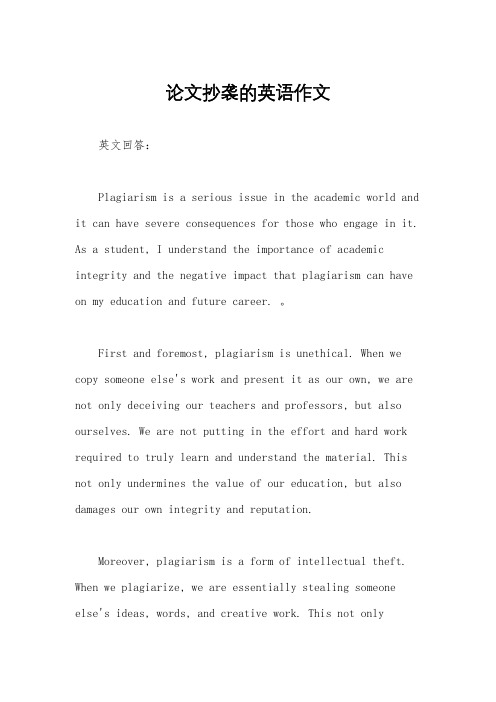
论文抄袭的英语作文英文回答:Plagiarism is a serious issue in the academic world and it can have severe consequences for those who engage in it. As a student, I understand the importance of academic integrity and the negative impact that plagiarism can have on my education and future career. 。
First and foremost, plagiarism is unethical. When we copy someone else's work and present it as our own, we are not only deceiving our teachers and professors, but also ourselves. We are not putting in the effort and hard work required to truly learn and understand the material. This not only undermines the value of our education, but also damages our own integrity and reputation.Moreover, plagiarism is a form of intellectual theft. When we plagiarize, we are essentially stealing someone else's ideas, words, and creative work. This not onlydisrespects the original author, but also violates their intellectual property rights. In the academic and professional world, this can lead to legal repercussionsand damage to one's reputation.In addition, plagiarism can have serious academic consequences. If a student is caught plagiarizing, they may face penalties such as failing the assignment, failing the course, or even expulsion from their academic institution. Furthermore, it can have long-term effects on their academic and professional career, as it may be difficult to gain the trust and respect of teachers, professors, and employers.To illustrate, I once had a classmate who plagiarized a significant portion of their research paper. They thought they could get away with it, but they were caught by the professor. As a result, they not only failed the assignment, but also had to appear before a disciplinary committee and faced serious repercussions, including a mark on their academic record. This experience served as a warning to me about the serious consequences of plagiarism.In conclusion, plagiarism is a serious offense withfar-reaching consequences. As a student, I am committed to upholding academic integrity and avoiding plagiarism at all costs. I understand the importance of originality, honesty, and hard work in my academic pursuits.中文回答:抄袭是学术界一个严重的问题,它会给从事抄袭行为的人带来严重的后果。
关于论文抄袭的英文作文
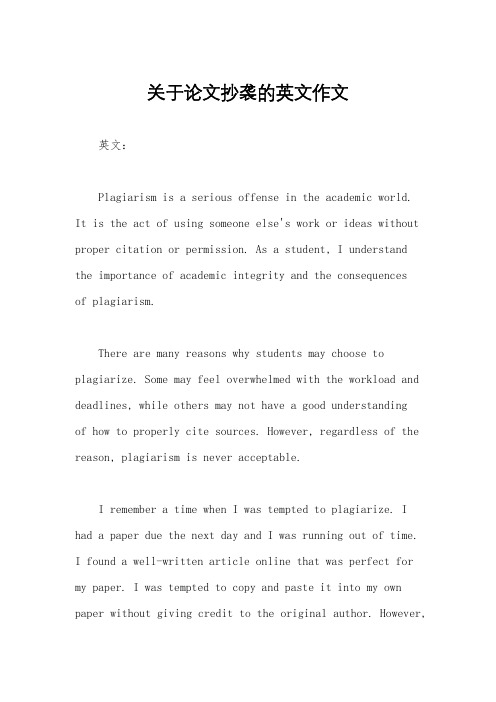
关于论文抄袭的英文作文英文:Plagiarism is a serious offense in the academic world.It is the act of using someone else's work or ideas without proper citation or permission. As a student, I understand the importance of academic integrity and the consequencesof plagiarism.There are many reasons why students may choose to plagiarize. Some may feel overwhelmed with the workload and deadlines, while others may not have a good understandingof how to properly cite sources. However, regardless of the reason, plagiarism is never acceptable.I remember a time when I was tempted to plagiarize. I had a paper due the next day and I was running out of time.I found a well-written article online that was perfect for my paper. I was tempted to copy and paste it into my own paper without giving credit to the original author. However,I knew that it was wrong and that I would face serious consequences if I were caught. Instead, I took the time to properly cite the article and incorporate it into my paper.Plagiarism not only harms the original author, but it also undermines the academic integrity of the student. Itis important for students to understand the consequences of plagiarism, which can include failing the assignment,failing the course, or even expulsion from school.In conclusion, plagiarism is a serious offense that should never be taken lightly. As students, we must take the time to properly cite our sources and give credit to the original authors. By doing so, we can uphold academic integrity and maintain the trust of our professors and peers.中文:抄袭在学术界是一种严重的违规行为。
我们应该如何看待抄袭问题的英语作文
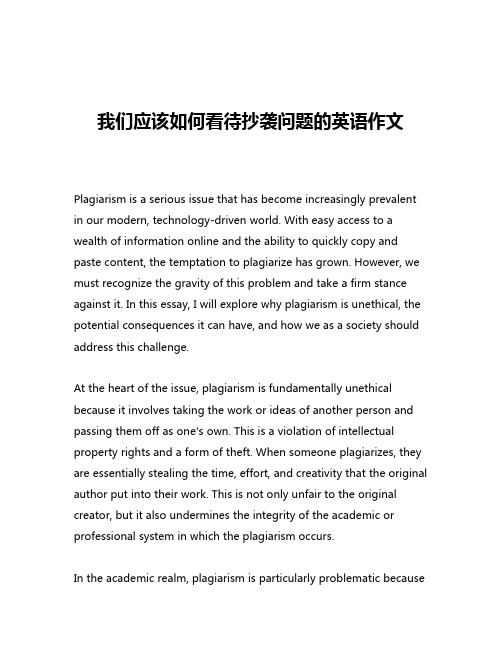
我们应该如何看待抄袭问题的英语作文Plagiarism is a serious issue that has become increasingly prevalent in our modern, technology-driven world. With easy access to a wealth of information online and the ability to quickly copy and paste content, the temptation to plagiarize has grown. However, we must recognize the gravity of this problem and take a firm stance against it. In this essay, I will explore why plagiarism is unethical, the potential consequences it can have, and how we as a society should address this challenge.At the heart of the issue, plagiarism is fundamentally unethical because it involves taking the work or ideas of another person and passing them off as one's own. This is a violation of intellectual property rights and a form of theft. When someone plagiarizes, they are essentially stealing the time, effort, and creativity that the original author put into their work. This is not only unfair to the original creator, but it also undermines the integrity of the academic or professional system in which the plagiarism occurs.In the academic realm, plagiarism is particularly problematic becauseit undermines the very purpose of education. The primary goal of education is to foster critical thinking, independent learning, and the development of new knowledge and ideas. When students plagiarize, they are not engaging in this process; instead, they are simply regurgitating information without truly understanding or contributing to it. This not only deprives the student of the opportunity to learn and grow but also cheats the educational system and undermines the value of the degrees and qualifications that are awarded.Beyond the academic sphere, plagiarism can also have serious consequences in the professional world. In many fields, such as journalism, research, or creative industries, the originality and authenticity of one's work are of paramount importance. When an individual plagiarizes, they are essentially fraudulently claiming credit for work that is not their own. This can lead to the loss of credibility, damage to one's reputation, and even legal repercussions, such as lawsuits or the revocation of professional licenses or certifications.Moreover, plagiarism can have far-reaching societal implications. When individuals or organizations engage in plagiarism, they are contributing to a culture of dishonesty and a lack of respect for intellectual property. This can undermine public trust in institutions, erode the value of education and knowledge, and stifle the creation of new and innovative ideas that are essential for societal progress.Given the gravity of the issue, it is clear that we must take a firm stance against plagiarism and work to address it at multiple levels. At the individual level, it is crucial that we instill a strong ethical foundation in students from a young age, teaching them the importance of academic integrity, the value of original thought, and the consequences of plagiarism. This can be done through comprehensive education on citation practices, the proper use of sources, and the development of critical thinking skills.At the institutional level, schools, universities, and workplaces must have clear and robust policies in place to prevent and address plagiarism. These policies should include strict guidelines for citation, the use of plagiarism detection software, and well-defined consequences for those who engage in plagiarism. Additionally, institutions should provide ample resources and support to help individuals develop the necessary skills and knowledge to avoid plagiarism, such as writing centers, workshops, and mentorship programs.Beyond the institutional level, we must also address plagiarism at a societal level. This may involve the development of stronger legal frameworks to protect intellectual property rights, the promotion of a culture of respect for original work, and the recognition and celebration of individuals and organizations that uphold the higheststandards of integrity. Additionally, we should encourage and support the creation of new, innovative ideas and the dissemination of knowledge, as this can help to reduce the perceived need for plagiarism in the first place.In conclusion, plagiarism is a serious issue that we must confront head-on. It is an unethical practice that undermines the foundations of education, the integrity of professions, and the progress of society as a whole. By taking a comprehensive approach that addresses the problem at the individual, institutional, and societal levels, we can work to eradicate plagiarism and foster a culture of respect for intellectual property and the pursuit of original thought. Only by doing so can we ensure that the fruits of human creativity and knowledge are truly valued and protected for generations to come.。
抄袭作业的英语作文

抄袭作业的英语作文Title: The Consequences of Plagiarizing Academic Assignments。
Plagiarism, the act of presenting someone else's work as your own without proper attribution, is a serious offense in academia with far-reaching consequences. Despite the prevalence of plagiarism detection tools and strict academic integrity policies, some students still succumb to the temptation of copying assignments. In this essay, we will explore the reasons behind plagiarism, its consequences, and propose strategies to avoid it.Firstly, one of the primary reasons for plagiarism is the pressure to excel academically. Students often feel overwhelmed by the workload and the desire to achieve high grades. In such circumstances, some resort to shortcutslike copying from online sources or classmates to meet deadlines. Additionally, lack of understanding of the assignment topic or poor time management skills can leadstudents to plagiarize as a quick fix solution.Secondly, the easy accessibility of information on the internet contributes to plagiarism. With a simple online search, students can find numerous sources related to their assignments. However, without proper citation and paraphrasing skills, they may inadvertently plagiarize content. Moreover, the prevalence of essay mills and academic ghostwriting services further facilitates academic dishonesty among students.Furthermore, cultural factors also play a role in promoting plagiarism. In some cultures, the emphasis on rote learning and memorization over critical thinking and originality may influence students' attitudes towards academic integrity. Additionally, societal pressure to succeed at any cost may outweigh ethical considerations for some individuals.Despite the perceived benefits of plagiarism in the short term, its consequences are severe and long-lasting. Firstly, academic institutions impose disciplinary actionsranging from failing grades on assignments to expulsionfrom the institution for repeated offenses. Such penalties tarnish students' academic records and jeopardize their future educational and career prospects.Moreover, plagiarism undermines the learning process by depriving students of the opportunity to develop critical thinking, research, and writing skills. By relying oncopied content, students miss out on the intellectualgrowth and academic integrity essential for their personal and professional development.Beyond the academic realm, plagiarism also has ethical and legal implications. It violates the rights of original authors and undermines the integrity of scholarly discourse. In professional settings, individuals who engage in plagiarism risk damaging their reputation and credibility, which can have severe repercussions on their careers.To prevent plagiarism, students must cultivate aculture of academic integrity and ethical behavior. They should familiarize themselves with citation styles andguidelines for proper referencing. Additionally, educators play a crucial role in promoting awareness about plagiarism and teaching students how to avoid it through educational interventions and discussions.In conclusion, plagiarism is a pervasive problem in academia with detrimental consequences for students and society at large. While the pressures and challenges of academic life may tempt individuals to engage in dishonest practices, the long-term costs outweigh any perceived benefits. By fostering a culture of academic integrity and ethical conduct, we can mitigate the prevalence of plagiarism and uphold the principles of scholarship and intellectual honesty.。
抄袭的后果英文作文
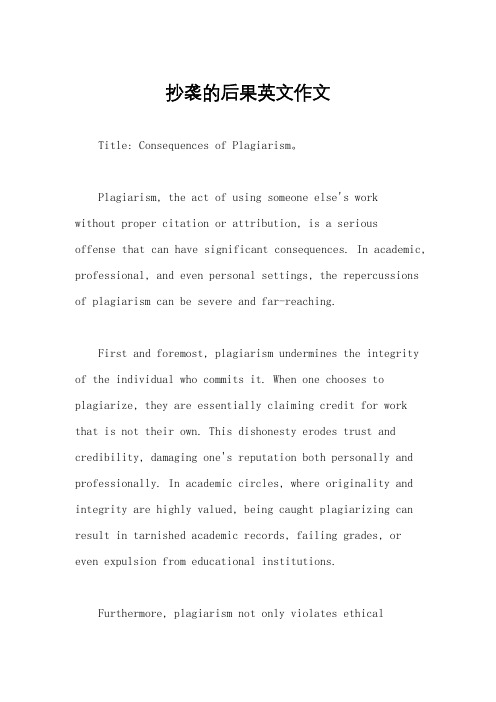
抄袭的后果英文作文Title: Consequences of Plagiarism。
Plagiarism, the act of using someone else's workwithout proper citation or attribution, is a seriousoffense that can have significant consequences. In academic, professional, and even personal settings, the repercussions of plagiarism can be severe and far-reaching.First and foremost, plagiarism undermines the integrity of the individual who commits it. When one chooses to plagiarize, they are essentially claiming credit for work that is not their own. This dishonesty erodes trust and credibility, damaging one's reputation both personally and professionally. In academic circles, where originality and integrity are highly valued, being caught plagiarizing can result in tarnished academic records, failing grades, or even expulsion from educational institutions.Furthermore, plagiarism not only violates ethicalprinciples but also legal ones. Intellectual property laws protect the rights of creators and authors, ensuring that they receive recognition and compensation for their work. When someone plagiarizes, they are infringing upon these rights, potentially leading to legal action and monetary penalties. In the professional world, plagiarism can result in lawsuits, job loss, and irreparable damage to one's career.Moreover, the consequences of plagiarism extend beyond the individual who commits the act. It also negatively impacts the original creators of the work being plagiarized. By failing to acknowledge their contributions, plagiarists deprive creators of the recognition and respect theydeserve for their intellectual efforts. This can be demoralizing and discouraging for individuals who have dedicated time and energy to produce original content.In addition to the immediate repercussions, plagiarism can have long-term effects on personal and professional development. Individuals who engage in plagiarism miss out on the opportunity to develop their own skills andknowledge. Academic assignments, for example, are designed to encourage critical thinking, research, and synthesis of information. By plagiarizing, students deprive themselves of the chance to enhance these essential skills, ultimately hindering their academic growth and future success.Furthermore, the stigma associated with plagiarism can follow individuals throughout their lives. In today's digital age, where information is readily accessible and easily traceable, instances of plagiarism can be quickly uncovered and spread. Even if one's plagiarism is discovered years later, the damage to their reputation may still be irreparable, affecting their credibility and opportunities for advancement.In conclusion, the consequences of plagiarism are numerous and profound. Beyond the immediate academic or professional penalties, plagiarism undermines integrity, violates ethical and legal principles, and deprives both the plagiarist and original creators of recognition and respect. To avoid these dire repercussions, it is imperative to uphold honesty, integrity, and originality inall aspects of life. Only by respecting the work of others and producing original content can individuals truly succeed and thrive in today's society.。
关于抄袭的英语作文

关于抄袭的英语作文Plagiarism: A Serious Offence。
Plagiarism is the act of using someone else's work without giving them proper credit. It is a serious offence that can have severe consequences. Plagiarism is not only unethical, but it is also illegal. Many people do not realize the gravity of this offence and continue to plagiarize without thinking twice. In this article, we will discuss what plagiarism is, why it is wrong, and how to avoid it.What is Plagiarism?Plagiarism is when someone uses another person's ideas, words, or work without giving them proper credit. This can include copying and pasting from a website, using someone else's research, or even using someone else's ideas without giving them credit. Plagiarism can occur in any form of media, including written work, music, art, and even videos.Why is Plagiarism Wrong?Plagiarism is wrong for several reasons. First and foremost, it is unethical. When someone plagiarizes, they are taking credit for someone else's work, which is dishonest. Plagiarism also undermines the value of original work. If everyone were to plagiarize, there would be no incentive for people to create new and original work. Plagiarism is also illegal and can result in legal action being taken against the offender.How to Avoid Plagiarism?To avoid plagiarism, it is important to understand what it is and how to properly cite sources. When using someone else's work, it is important to give them proper credit. This can be done by citing the source of the work, using quotation marks for direct quotes, and paraphrasing the work in your own words. It is also important to use plagiarism detection software to ensure that your work is original and not copied from someone else.Conclusion。
论文抄袭 英文作文
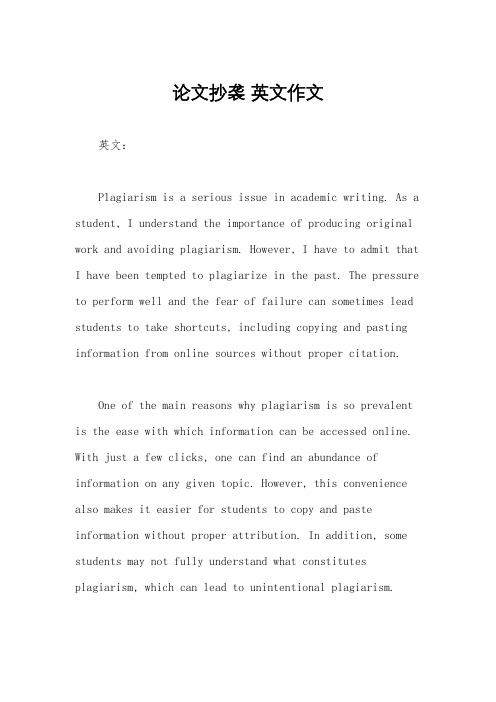
论文抄袭英文作文英文:Plagiarism is a serious issue in academic writing. As a student, I understand the importance of producing original work and avoiding plagiarism. However, I have to admit that I have been tempted to plagiarize in the past. The pressure to perform well and the fear of failure can sometimes lead students to take shortcuts, including copying and pasting information from online sources without proper citation.One of the main reasons why plagiarism is so prevalent is the ease with which information can be accessed online. With just a few clicks, one can find an abundance of information on any given topic. However, this convenience also makes it easier for students to copy and paste information without proper attribution. In addition, some students may not fully understand what constitutes plagiarism, which can lead to unintentional plagiarism.In order to avoid plagiarism, it is important to understand what it is and how to properly cite sources. Plagiarism is the act of using someone else's work without giving them proper credit. This can include copying and pasting text, using someone else's ideas without attribution, or even using images or graphs without permission. To avoid plagiarism, it is important to always cite your sources and give credit where credit is due.中文:论文抄袭是学术写作中的一个严重问题。
抄袭现象英文作文

抄袭现象英文作文Plagiarism is a serious issue that affects both academic and professional settings. It occurs when someone uses someone else's work without giving proper credit or permission. This can include copying text, ideas, or even entire papers. Plagiarism not only violates ethical standards, but it also undermines the integrity of the work being produced.Plagiarism can be intentional or unintentional. Sometimes, people may not realize that they areplagiarizing because they do not understand the rules of citation or are not aware of the consequences. Other times, people may intentionally plagiarize in order to save time or to make their work appear more impressive. Regardless of the reason, plagiarism is never acceptable.Plagiarism can have serious consequences. In academic settings, it can result in failing grades, suspension, or even expulsion. In professional settings, it can lead toloss of reputation, legal action, or even job loss. It is important to take plagiarism seriously and to take steps to prevent it from happening.There are several ways to avoid plagiarism. One way is to always give credit where credit is due. This means properly citing sources and using quotation marks when necessary. Another way is to use plagiarism detection software, which can help identify instances of plagiarismin written work. It is also important to understand the rules of citation and to seek clarification if there is any confusion.In conclusion, plagiarism is a serious issue that can have significant consequences. It is important to understand what constitutes plagiarism and to take steps to prevent it from happening. By doing so, we can maintain the integrity of our work and ensure that we are producing original, high-quality content.。
- 1、下载文档前请自行甄别文档内容的完整性,平台不提供额外的编辑、内容补充、找答案等附加服务。
- 2、"仅部分预览"的文档,不可在线预览部分如存在完整性等问题,可反馈申请退款(可完整预览的文档不适用该条件!)。
- 3、如文档侵犯您的权益,请联系客服反馈,我们会尽快为您处理(人工客服工作时间:9:00-18:30)。
高中英语作文范文:关于抄袭About Plagiarizing
Recently, a famous case was closed. The case was about a screenwriter plagiarizing another writer’s novel. The public kept their eyes on this case, most people believed that the screenwriter indeed plagiarized someone’s work, because the story he wrote had some much similarity with another
writer’s play. The screenwriter denied that he had copied other writer’s work. What he said made the writer very angry, the writer charged the screenwriter. Now the result came out, the writer won the case and the screenwriter had to apologize. Plagiarizing someone’s work is a serious crime, it is not respectful to others and steal people’s work. Such behavior should be condemned strongly.
最近,一单的案子结案了。
此案是关于一位编剧抄袭另一个作家的
小说。
大众关着这件案子,绝大部分人认为编剧确实抄袭别人的作品,
因为他写的故事和另一个作家的戏剧有很多相似性。
编剧否认他抄袭
其他作家的作品。
他所说的让作家很生气,作家起诉了编剧。
现在结果
出来了,作家打赢了官司,编剧就此案道歉。
剽窃别人的作品是一种严
重的犯罪,盗取别人的作品是不尊重他人的表现。
这种行为应该受到谴
责。
